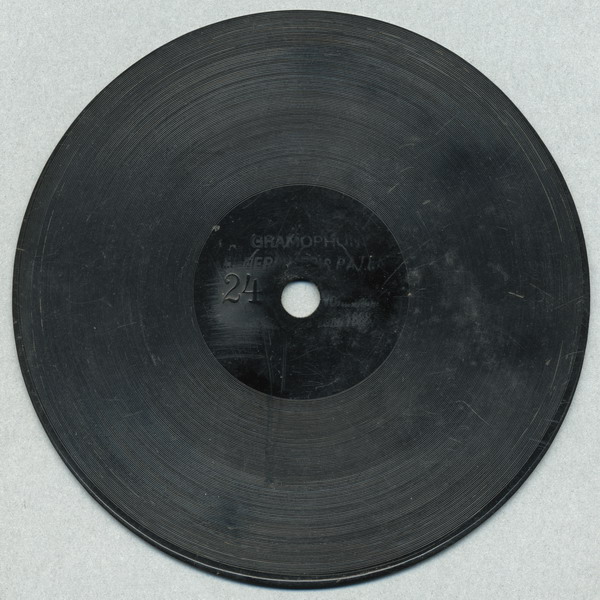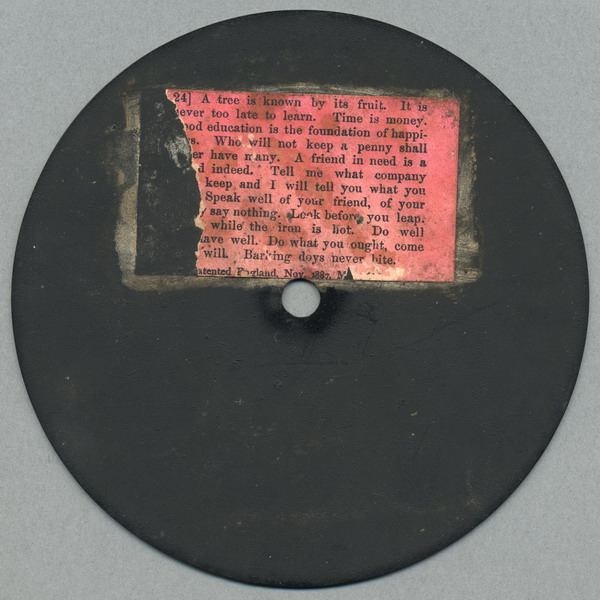

|
|
|||
| |
Retour à la page d'accueil des disques Berliner Gramophone de 12,5 cm |
||
|
|
|||
Le catalogue en ligne des
disques Berliner Gramophone de 12,5 cm
The Gramophone five inch Berliner
records online catalogue
A TREE IS KNOWN BY ITS FRUIT


To listen (fragment)
Berliner 5 inch record #24 - A TREE IS KNOWN BY ITS FRUIT
A tree is known by its fruit. It is never too late to learn. Time is money. Good education is the foundation of happiness. Who will not keep a penny shall never have many. A friend in need is a friend indeed. Tell me what company you keep and I will tell you what you are. Speak well of your friend, of your enemy say nothing. Look before you leap. Strike while the iron is hot. Do well and have well. Do what you ought, come what will. Barking dogs never bite.
A tree is known by its fruit.
Luke 6: 43- 45. A good tree does not produce bad fruit and a bad tree cannot produce good fruit, each tree is known by its fruit"
Matthew 12:33. Either make the tree good, and its fruit good; or make the tree corrupt, and its fruit corrupt: for the tree is known by its fruit.
Judge the tre by his frute, and not by his leves. [1528 W. Tyndale Obedience of Christian Man 88V]
If then the tree may be known by the fruit there is virtue in that Falstaff. [1597-8 Shakespeare Henry IV, Pt. 1 ii. iv. 414]
A tree is known by the fruit, and not by the leaves. [1670 J. Ray English Proverbs 11]It is never too late to learn.
Proverb of latin origin. It is never too late to learn what it is always necessary to know. [1678 R. L'estrange Seneca's Morals ii. xx.]
Never too late to learn. [1721 J. Kelly Scottish Proverbs 266]
'It is never too late to learn,' cried he. 'I will make a fisherman of you in no time, if you will only attend to my directions.' [1856 W. Collins Lady of Glenwith Grange in After Dark II. 3]Time is money
The most costly outlay is time (attributed to Antiphon).
They saye tyme is precious. [1572 T. Wilson Discourse upon Usury 33]
Remember that Time is Money. He that can earn Ten Shillings a Day and sits idle one half of that Day has really thrown away Five Shillings. [1748 B. Franklin Papers (1961) III. 306]
'You don't come often to the club, Stout?' 'No, time is money.' [1840 Bulwer-Lytton Money III. vi.]Good education is the foundation of happiness
Victorian proverbWho will not keep a penny shall never have many
A penny saved is a penny gained. Penny and penny will make many (Little drops of water make the might ocean).
Wer den Pfennig nicht ehrt, ist des Talers nicht wert.A friend in need is a friend indeed
A friend in need is one who helps when one is in need or difficulty. Cf. [Euripides Hecuba l. 1226] for in adversity good friends are most clearly seen;
[Ennius Scaenica 210 (Vahlen)] amicus certus in re incerta cernitur , a sure friend is known in unsure times.
Æt thearfe man sceal freonda cunnian [friend shall be known in time of need]. [ c 1035 Durham Proverbs (1956) 10]
I shal the save When tyme cometh thou art in nede; Than ogh men frenshep to shewe in dede . [ a 1400 Titus & Vespasian (1905) 98]
Ful weele is him that fyndethe a freonde at neede . [ a 1449 Lydgate Minor Poems (EETS) II. 755]
It is sayd, that at the nede the frende is knowen . [Caxton's Sonnes of Aymon , 1489]
A friend in need is a friend indeed . [1678 J. Ray English Proverbs (ed. 2) 142]
A Friend in Need is a Friend indeed . [1773 R. Graves Spiritual Quixote II. viii . xx. ( heading )]
You came to my side when I was in trouble. A friend in need is a friend indeed. [1866 C. Reade Griffith Gaunt III. xv.]Tell me what company you keep and I will tell you what you are
Cervantes, Don QuixoteSpeak well of your friend, of your enemy say nothing
Welsh proverb : translation of "Dywed yn dda am dy gyfaill, am dy elyn dywed ddim"Look before you leap
First loke and aftirward lepe. [ c 1350 Douce MS 52 no. 150]
We say Loke yer thou lepe, whose literall sence is, doo nothinge sodenly or without avisement. [1528 W. Tyndale Obedience of Christian Man 130]
He that looketh not before he leapeth, may chaunce to stumble before he sleapeth. [1567 W. Painter Palace of Pleasure II. xxiv.]
Looke before you leape. [1621 Burton Anatomy of Melancholy ii . iii.]
Look before you leap is an old proverb. Jack had pitched into a small apiary, and had upset two hives of bees. [1836 Marryat Midshipman Easy I. vi.]Strike while the iron is hot
A proverb originally alluding to the blacksmith's art. Cf. late 13th-cent. Fr. len doit batre le fer tandis cum il est chauz , one must strike the iron while it is hot.
Whil that iren is hoot, men sholden smyte. [ c 1386 Chaucer Tale of Melibee l. 1035]
And one good lesson to this purpose I pyke [pick] From the smiths forge, whan thyron is hote stryke. [1546 J. Heywood Dialogue of Proverbs i . iii. A4]
I think it wisdome to strike while the iron is hot. [1576 G. Pettie Petit Palace 181]
Finding the affections of the people warmly inclining to him, he, as thinking 'twas best striking while the iron is hot, made this speech. [1682 Bunyan Holy War 18]
If so be as how his regard be the same, why stand shilly shally? Why not strike while the iron is hot, and speak to the 'squire without loss of time? [1771 Smollett Humphry Clinker III. 242]
Let George cut in directly and win her. Strike while the iron's hot. [1848 Thackeray Vanity Fair xxi.]Do well and have well
Scottish proverb, latin origin. Do well and have well. Qui bontés fait, bontés attend.
"Do well and have well, and God shall have thy soul.
And do evil and have evil, hope none other
That after thy death day thou shalt turn to the Evil One."Do Well, and have well, and God shall have thy soul, [ Visio Willelmi de Petro Ploughman , Passus VII.122-127, Cambridge MS B.15.17 (W).]
Et qui bona egerunt ibunt in vitam eternam
Qui vero mala in ignem eternum
Peter quod țe preest țoo . I kan no pardon fynde
But dowel and haue wel . and god shal haue ți soule
And do yuel and haue yuel . hope țow noon ooțer
But after ți deeț-day . țe deuel shal haue ți soule"By St. Peter!" said the priest, "I find here no pardon, but 'do well, and have well, and God shall have thy soul; and do evil, and have evil, and to hell shalt thou go.
Piers Plowman (w. ca. 1360-1399) or Visio Willelmi de Petro Ploughman (William's Vision of Piers Plowman) is the title of a Middle English allegorical narrative poem by William Langland. It is written in unrhymed alliterative verse divided into sections called "passus" (Latin for "steps"). Piers is considered by many critics one of the early great works of English literature along with Chaucer's Canterbury Tales. The poem - part theological allegory, part social satire - concerns the narrator's intense quest for the true Christian life, which is told from the point of view of the medieval Catholic mind. This quest entails a series of dream-visions and an examination into the lives of three allegorical characters, Dowel (" Do-Well "), Dobet (" Do-Better "), and Dobest (" Do-Best ").
The poem begins in the Malvern Hills in Worcestershire. A man named Will falls asleep and has a vision of a Tower set upon a hill and a fortress (donjon) in a deep valley; between these two symbols of heaven and hell is a "fair field full of folk", representing the world of mankind. In the early part of the poem Piers, the humble plowman of the title, appears and offers himself as the narrator's guide to Truth. The latter part of the work, however, is concerned with the narrator's search for Dowel, Dobet and Dobest.
Sources : The Piers Plowman Electronic Archive : http://www.iath.virginia.edu/seenet/piers - See also : http://en.wikipedia.org/wiki/Piers_PlowmanDo what you ought, come what will
Scottish proverb.
"Would you live with ease? Do what you ought, not what you please." (Benjamin Franklin)
Do what you ought; wasn't what you wanted all out.